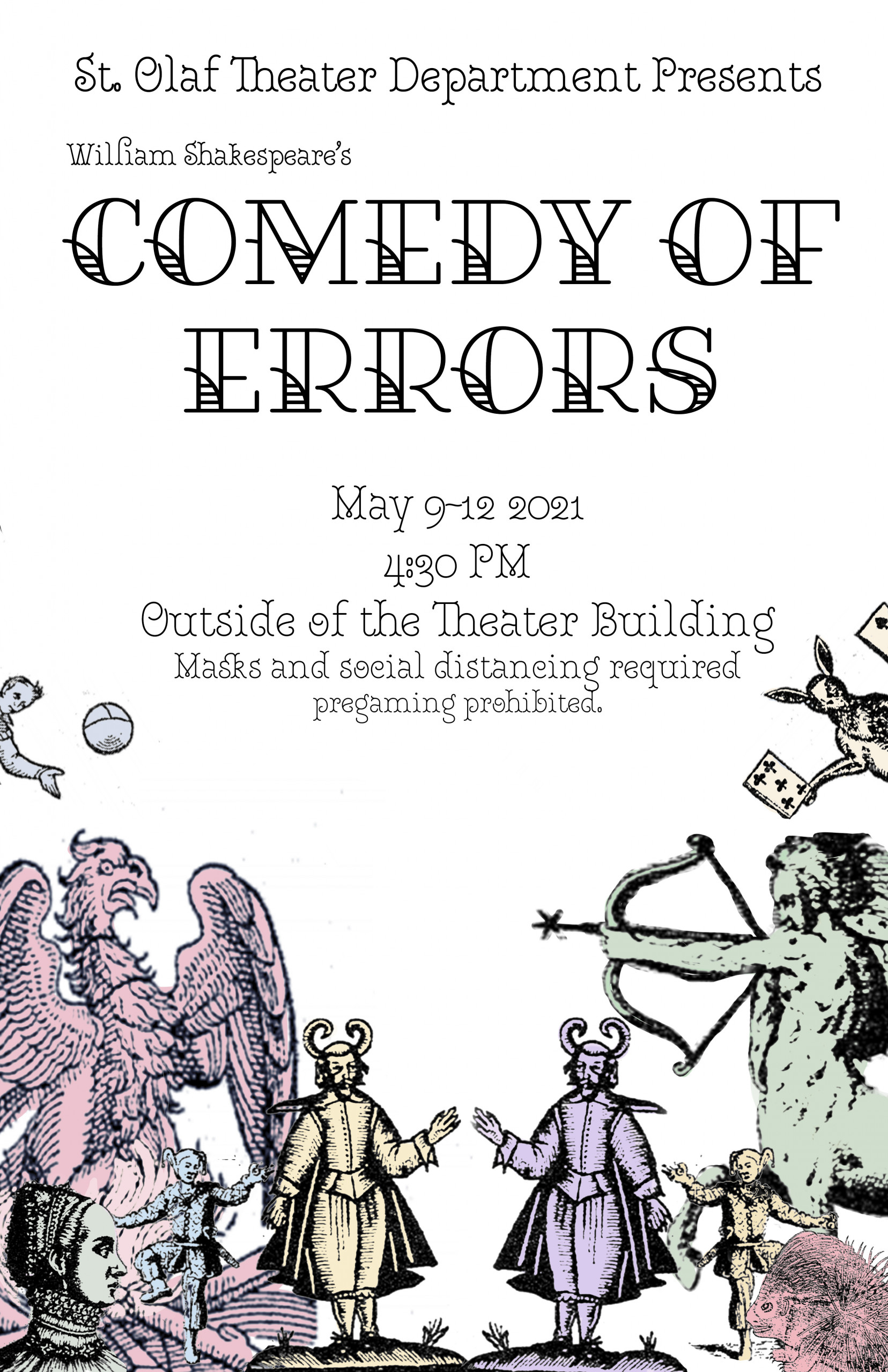Cast
Duke – Jack Stetler
Egeon – Elijah Leer
Antipholus of Ephesus – Ch’aska Farber
Antipholus of Syracuse – Bianca Davis
Dromio of Ephesus – Marley Lagares
Dromio of Syracuse – Moses Young
Adriana – Emilie Hapgood
Luciana – Aerin O’Malley
Luce – Claire Correll
Courtesan – Dorienne Hoven
Angelo – Seth Retzlaff
Balthasar – Meredith Enersen
First Merchant – Megan Allbrooks
Second Merchant – Katie Moore
Pinch – Jonah O’Bert
Emilia – Jasmine Carter
Jailer/Officer/Messenger – Abigail St. John
Production Team
Director – Bill Sonnega
Scenic Design/Shop Supervisor –Todd F. Edwards
Sound Design – Parker Love
Costume Design/Shop Supervisor – Aimee Jillson
Lighting/Sound Supervisor – Brian Bjorklund
Stage Manager/Sound Operator – Grace Peacore
Choreographer – Ayee Mounivong
Assistant Stage Manager/Dance Captain – Harper Lagares
Assistant Director – Johnna Johnson
Dramaturg –Thomas Bryant
Production Coordinator – Jeanne Tangren Hatle
Poster Design – Meredith Enersen
Production Sound Mixer – Claire Strother
Backstage Crew – Gabriel Maxwell
Backstage Crew – Mady Smith
Set Up/Take Down Crew – Caroline Allessi
Set up/Take Down Crew – Asa Kienitz-Kincade
Scene Shop: Bianca Davis, Alex Duminy, Victor Fesenmeyer, Mike Gough, Kate Helin-Burnette, Matthew Humason, Bradford Jensen, Maycee Klein, Collin Kreiger, Tyler Krohn, Alice Langby, Gabriel Maxwell, Mia Schoenbeck, Mady Smith, Sam Stright, Jared Vidervol
Lighting: Ariel Bodnar-Klein, Matthew Humason, Moses Young, Parker Love
Costume Shop: Grace Bloomquist, Lucy Cavener
Publicity: Ariel Bodnar-Klein, Meredith Enersen, Tamsin Olson
This production is dedicated with love to Alice Jane Tibbetts ’20
But if the while I think on thee, dear friend,
All losses are restor’d, and sorrows end.
William Shakespeare, Sonnet 30
Acknowledgements
Ryan Cleasby, Peter Christian Hansen, Sara Pillatski-Warzeha, Bryan Schmidt, St. Olaf Facilities, Karen Peterson Wilson
 Thank you!
Thank you!
To Steven Fox for his generous support of the Theater Department
Comedy Of Errors Dramaturg’s Note
By Thomas Bryant
Aside from spending hours with the Oxford English Dictionary to understand all of Shakespeare’s words, a dramaturg is concerned with the central question of theater makers: Why this play now? Specifically, why tackle Shakespeare outside, working through Covid restrictions that have shut theaters down, as well as fighting Minnesotan weather. One reason is to commemorate 100 years of the St. Olaf Theater Department, which began with a production of Shakespeare’s The Merchant Of Venice. That question of why has been with us since that first production.
Whereas the St. Olaf choir emerged from the deep connection between music and Lutheran heritage in 1912, theater had a harder time finding its footing as many of the school’s Lutheran faculty were against theater. In 1918, Theater began at the college as a series of Dramatic Reading Pageants to benefit the Red Cross, and once the door was open student organizations began to put on their own plays. To accommodate increasing student demand, the faculty began sponsoring theatrical productions, beginning with the English department agreeing to sponsor one play a year. On April 21, 1921, Elizabeth Kelsey, Theater professional and Northfield local, was secured to direct the first production of The Merchant Of Venice in honor of Shakespeare’s birthday. The production was staged on an approximation of one of Shakespeare’s stages in the old gymnasium, as there was no theater facility at the time. (In this spirit, our production of The Comedy Of Errors has a stage built on the theater building which was originally the woman’s gymnasium so that we could obey Covid Guidelines). The Merchant of Venice was a success and was followed by Norwegian language plays from the Norwegian department as well as more Shakespeare from the English department until the chapel burned down, at which point the gymnasium had to be used for religious services.
In 1924, Elizabeth Kelsey took losing her performance space as an opportunity to begin St. Olaf’s history of outdoor productions of Shakespeare’s plays with a production of A Midsummer Night’s Dream in Norway Valley. Much like The Comedy Of Errors, rehearsals had to be carefully planned around weather, daylight, and class times, resulting in chilly 5 A.M. rehearsals that showed the students’ dedication to the cause. Also, as actors for The Comedy Of Errors and last fall’s Mamma Mia had to dress in their rooms for Covid safety, Kelsey would have to keep costumes at her house and lug them to rehearsal daily. Outdoor Shakespeare continued until 1941, fading out as St. Olaf drama was limited as school resources became focused on the war effort. The next prominent outdoor Shakespeare production was another production of The Merchant Of Venice, directed by Ralph Haugen in 1955. This production used Thorson Hall as a set piece and took place on the back lawn, again looking a lot like our production of The Comedy Of Errors. All of Thorson’s bathrooms had to be locked during the performance because of a plot to simultaneously flush all the toilets when one actor (Wendell Miller ‘55) entered.
Theater has continued at St. Olaf since and Elizabeth Kelsey and Ralph Haugen are memorialized in the Kelsey Theater and Haugen Black Box. Our outdoor performance of The Comedy of Errors, however, may be more in their spirit. As Kelsey and Haugen’s students wanted so badly to do theater they did whatever they had to do, so we have constructed an outdoors set, dealt with weather, and adhered strictly to Covid guidelines. The history of Shakespeare and theater at St. Olaf is the history of pulling together and doing whatever it takes to put on a show for the community.
However, theater has changed and we have the perspective to know that The Merchant Of Venice does not represent St. Olaf Theater’s values. Honoring the theater’s history while reckoning with and improving on it is central to The Comedy Of Errors. Shakespeare derived the plot from an early Roman comedy by Plautus, The Menaechmi, which follows a pair of separated, identical twins who end up in the same city and are mistaken for each other. Scholarship focuses on Shakespeare’s decision to complicate this set up by adding a pair of identical twin servants to The Comedy Of Errors, allowing for more ridiculous antics.
Notably, the character of Peniculus is excluded from Shakespeare’s version. In The Menaechmi, Peniculus is the parasitical friend of the character who would become Antipholus of Ephesus. Peniculus acts as the villain, threatening to steal wealth and exploit the confusion. By removing the antagonist, Shakespeare allows many of his characters to be variously heroic and villainous, creating a community where the problem is not exploitive outsiders but the community members failing to communicate or be kind to one another. While The Comedy Of Errors is a hilarious good time, I am hopeful that we can also use it as a chance to reflect on how we treat each other as a community and how we harm each other with our assumptions.
As generations of Oles have done before us, let’s kick back and enjoy the weather, the community, and some Shakespeare. Happy 100 years to St. Olaf Theater and here’s to many more!
Thomas Bryant, Production Dramaturg









You must be logged in to post a comment.